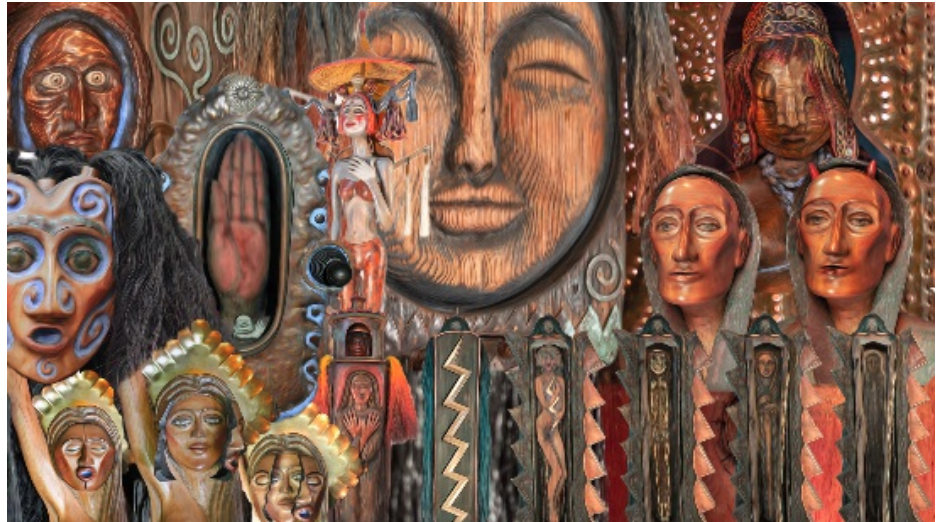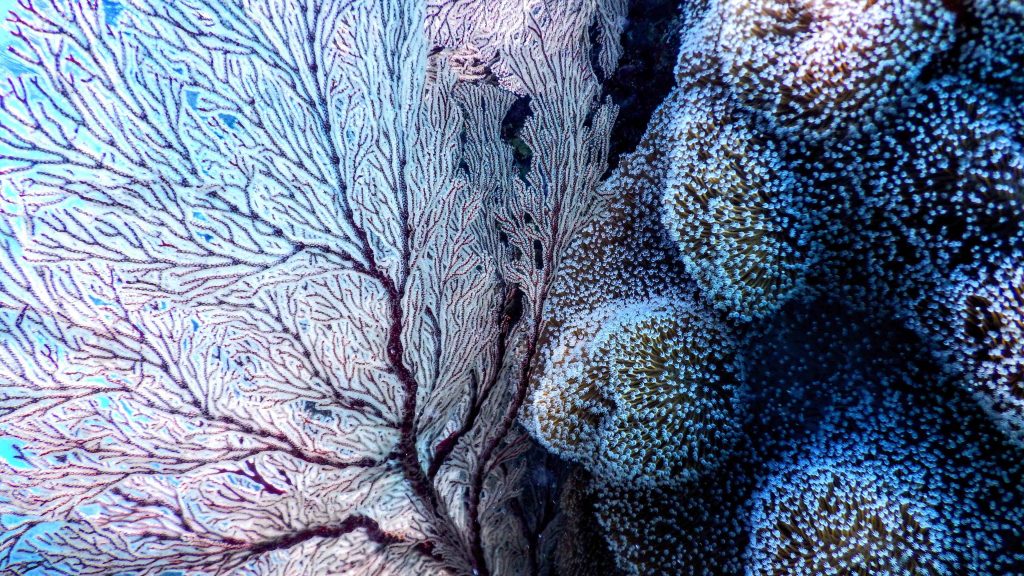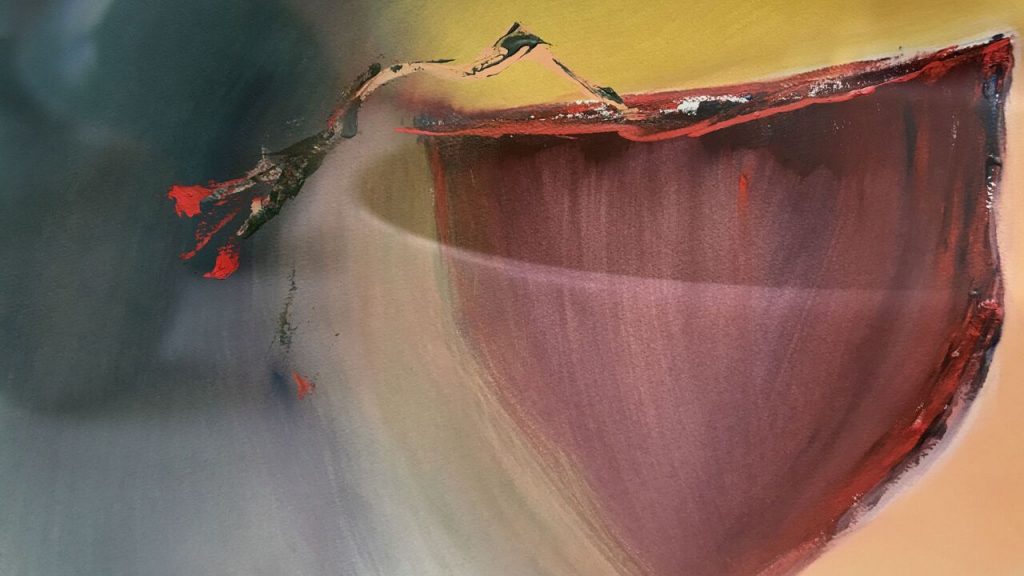Nature’s Guide to Ending Our Diet Wars
featured image | by Chris Lawton
From an evolutionary perspective it is very strange
that an intelligent species has to tell itself what to eat on its own planet
and to argue fiercely over the alternatives!
Something strange and unsettling is happening in my food world: I have been plunged unwittingly into an array of Diet Wars among progressive Foodies—people I thought were united in fighting against industrial farming with its toxic chemicals, cruelty and the corruption of resulting food evident in long lists of unpronounceable ingredients in anything processed, which most food is now.
This baffling and unexpected war has erupted within the progressive movement of people who agree that food must be produced in healthy environments free of cruelty or toxins during growth, processing and distribution if it is to be truly healthy for us to consume. Suddenly we are arguing fiercely whether we must be Vegans, Vegetarians, Ovo-Lacto Vegetarians, Mediterraneans, Paleos or Ketos, with all sorts of particulars toward fat-free, carb-free, sugar-free, salt-free, etc. diets.
I see this war making enemies of my own friends, and am finding myself spending ever more time sorting through research studies, endless advice and arguments just to engage intelligently in food (and supplement) centered conversations. This situation has become more than unpleasantly annoying; I now sense it is dangerous as well, with potentially disastrous consequences. So I want to understand these aggressive conflicts that actually amount to one new war with multiple sides: how it came about and what we can do to end it.
Personally, I am an unabashed ‘foodie’ who ranks eating among the very top pleasures in life. Born well before the Second World War, my rural American peers and I grew up on the highest quality ‘farm to table’ food—all organic though that label did not yet exist—now available only in very select restaurants. Like the proverbial slow-boiled frog, I went along with the flow of life as my diet was gradually adulterated by a modern food industry’s takeover that put more and more food choices before me, less and less of it fresh from the farm. Year by year, more and more industrial links were inserted between me and the original sources of my food through the wonders of chemistry, processing, preservation, packaging and transportation.
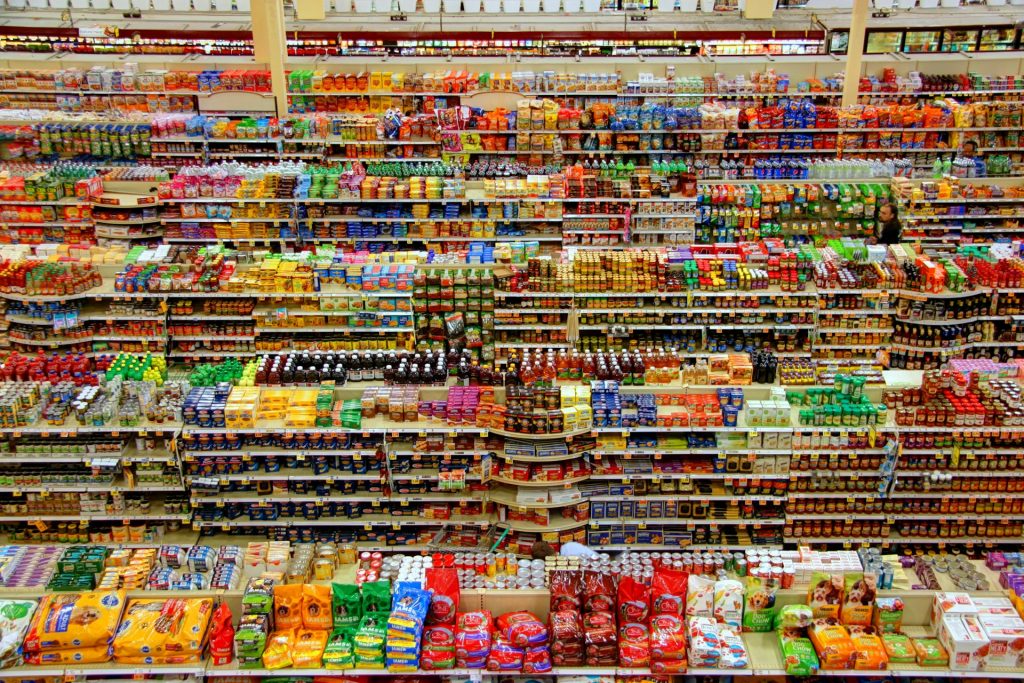
While increased food variety and convenience is seductive, I would happily trade it for a world freed from artificial and cruel food growing and processing, as I believe everyone on all sides of this new war would. I have no problem with any dietary choice anyone makes—vegan, paleo or whatever—within the range of foods that can be produced in conscious, healthy ways. Our bodies are not all alike, nor are the ecosystems in which we live. I do not believe there is any one healthy diet to fit all. We must all learn to listen to our own bodies’ responses as we experiment and make our own decisions.
I have been delighted by the organic food movement launched in Berkeley ‘60s, when we tore down fences between yards to grow our own veg communally and had block-long feasts; in ‘70s Boston I witnessed the pop-up of small shops, local cooperatives and farmers markets—the kind of food I was raised on having taken just a few post-war decades to make a comeback, and right in the midst of the expanding empire of global corporate Big Food. As the Permaculture movement exploded around the world, so did—on a far greater scale—Big Food’s globalized, mechanized, chemicalized, fossil-fueled production system.
Enter the new Diet War
So why the new war within the one with lines so well drawn? What has eroded tolerance for all healthy diets? I’m finding that such freedom of choice is no longer acceptable; that there are those who want me to endorse just one of the dietary options and defend it against the others by calling them out as wrong.
Our common cause in crusading against CAFOs, for example, has been torn between those against all meat and those for healthy meat. The crusade for healthy fats and oils is now opposed by those who insist all fats and oils are harmful, and the weapons in such new battles are the proclaimed findings of whichever research project’s outcome endorses your particular cause. In my experience of looking at endless such research, there are two major problems:
- Few studies truly distinguish between healthy and unhealthy veg, meats, oils, and other food categories. Thus, for example, Spam is lumped in with grassfed organic meats, and soy, corn and rape oils (the newer grain/bean oils) with olive and coconut oil (fruit oils).
- For every result arguing against meat, fat, oil, salt, particular veg, etc. one can usually find another equally valid looking study saying the same is harmless or beneficial. Despite the lack of reliable overall agreement on health benefits, the closest agreement I have found is for the Mediterranean diet, which is very varied, excluding no category of food, and qualifies as a ‘plant-based diet.’
Holistic Nutrition Counselor and Ayurvedic Advisor Natasha Uspensky, CHHC, AADP describes a ‘plant-based’ diet as including the Mediterranean diet, which is high in whole plant foods and low in poultry, cheese, yogurt, and red meat. “Think of it this way—a vegan diet is plant-based, but a plant-based diet isn’t vegan. With the occasional grass-fed burger, eggs, cheese, or collagen protein, plant-based can be close, but not fully vegan.”
By this definition, most Health Foodies, including myself, eat plant-based diets. This unified us as, along with Paleos, a rapidly growing strong force that was holding Big Food to account for making our food supply unacceptably unhealthy. Yet, somehow, vegans have now taken over this ‘plant based’ definition to exclude the rest of us, with a new righteousness that makes the rest of us look bad, if not downright evil.
An incomplete view of the food world
There is a strong and overt emotional basis for the most vocal vegan crusades of this new war—and the emotions emanate from two rational beliefs with which I am actually in complete agreement:
- Belief that our food choices can be good or bad for our local and global ecosystems, which are being depleted and poisoned in truly troubling, even disastrous, ways, and
- Belief that we must end the practices that torture our food animals
These matters, about which vegans truly are leading the way, are very worth their concerns. However, they represent a picture, not wrong, but woefully incomplete, and, because of what they leave out, dangerously misguided.
Insisting that vegans alone are saving the planet; that omnivores who make the same claims are necessarily dead wrong, they are in danger of actually contributing to the problems we face. Case in point: Vilifying the Savory Institute for re-greening ever more of the vast desertified grasslands of Earth by restoring hooved animals that had been stripped from them is evidence of misunderstanding nature’s cooperative alliances. Grasslands cannot sustain themselves through dry seasons (which now last ever longer) without grass-feeding hooved animals to process the grass into fertilizers and break up grass clumps to allow rain in when it comes.
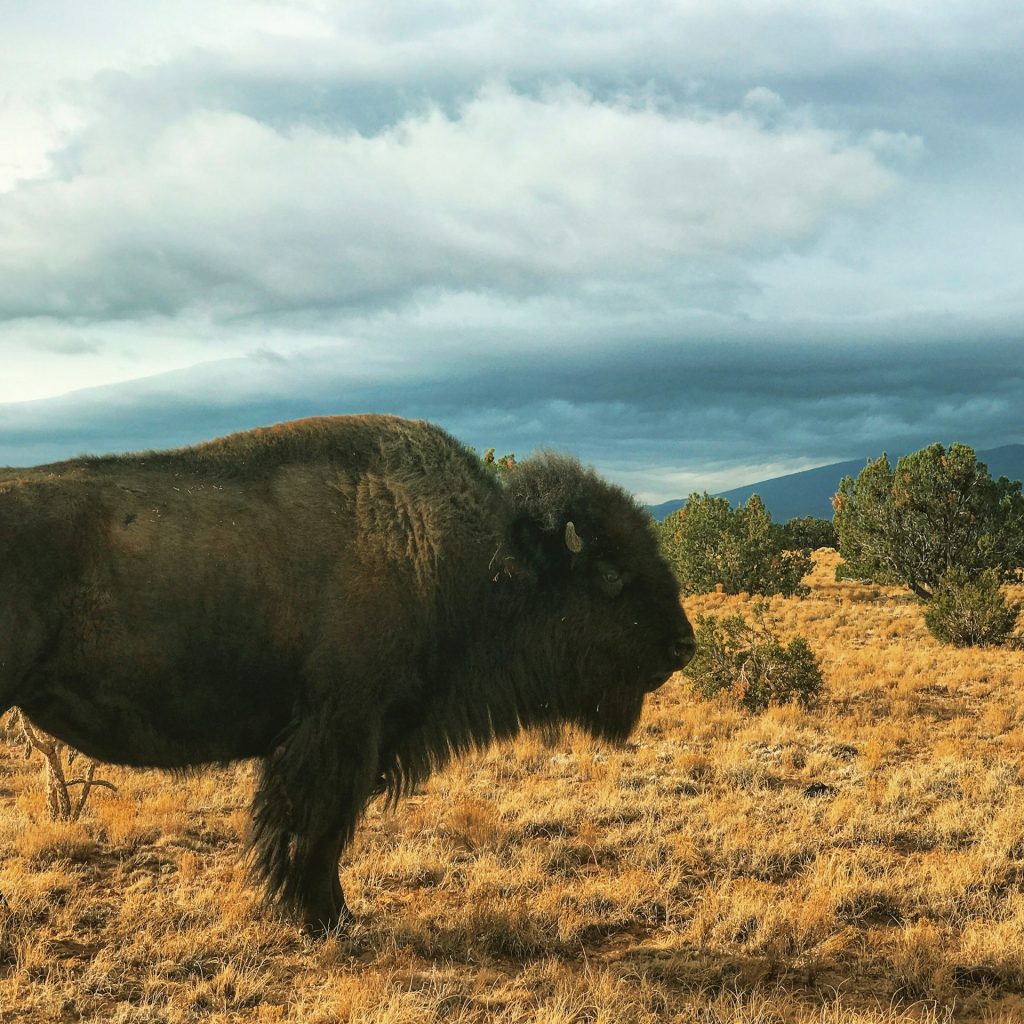
When vegans insist that their diets are cruelty free, they are also mistaken. Quite willing to cut and chew up raw veggies—the fresher from the soil the better—I must assume that vegans have paid no attention to research on plants showing them to be as sentient as animals, if not more so; as capable of feeling pain as any animal. (See, for just one example, Stefano Mancuso’s book Brilliant Green).
May I also point out that organically raised plants rely on insect and other animal matter decaying in soils for their own nourishment, and that a number of plant species themselves are unabashed carnivores?
A little evolution biology
Evolution biology reveals the tightly interactive co-existence of plants and animals as going back to their most remote bacterial ancestors, which worked out their oxygen-for-CO₂ relationship. Played out in plants, this was intuited by native peoples who breathed on trees to thank them for oxygen while gifting back their CO₂ without knowing these chemical labels for the gases in our in-breaths and out-breaths.
Indeed, evolution biologists, long held back by market capitalist economists’ support of Darwinism as pure competition, now understand how cooperation accounts for the greatest evolutionary advances: nucleated cells as bacterial cooperatives; multi-celled creatures as nucleated cell cooperatives. Ecosystems are immensely interwoven cooperatives of bacteria, nucleated cells and multi-celled creatures from lichens and fungi to plants and animals. Competition exists, but as pioneering, youthful modes within overall mature cooperation, endlessly striving to rebalance after every disruption.
We humans are a young and, from an evolutionary perspective, a desert-making specie from the time we abandoned hunter gathering to make food fields, cutting forests by hand till we invented giant machines to speed up the process. At the same time, we removed hooved animals from grasslands, penning up those we wanted as food and for fertilizer. Wanton shooting of American buffalo led to a disastrous Dust Bowl era, so it went elsewhere, to the point of my own conclusion that we humans must be seen as a desert-making specie.
To wit, the only evidence of our presence on Earth, as seen from the moon over time, would be the expansion of deserts we have caused. We continue this process on an industrial scale now, with the consequence of changing our climate enough to tip Earth into an onrushing Hot Age, instead of the Ice Age for which we were due. Savory’s work is truly revolutionary among ways of restoring our severely damaged ecosystems. And it produces very healthy, free grass-fed meat from animals roaming broad territory in freedom and health.
The division of plants and animals into separate industrial scale monocultures is a proven disaster that wrecks soils and water tables. The Green Revolution of plant culture, notably grains, caused deserts in the name of making gardens, and the UN has published research saying that the only way to feed the burgeoning human population in the future is to go back to small natural farms worldwide! Full report here.
No system for rebalancing our damages by regreening deserts has been effective without using animals to do so. Indeed, the relatively recent market economy separation of plants and animals in our devised agriculture is so unnatural that it created two new problems from one solution, as animal waste piles up and pollutes waterways while food plants are weak with undernourishment on artificial fertilizers.
Let me add lastly, while still on the topic of evolution, that academic research on the origins of humans has shown a clear correlation between the explosion of our human brains and our invention of tools for hunting and fishing, which gave us much greater access to quality proteins and fats. Indeed it indicates that eating land and sea creatures in addition to plants was very good for us—indeed actually made us human. To this day, the most environmentally challenged, yet well adapted, people in the Arctic would live primarily on meat and fish if isolated from distant imports. In any case, animal species are classed as either herbivores, carnivores or omnivores, and all humans are technically omnivores, regardless of what they eat individually, culturally or regionally.
It should be noted that indigenous people developed widely varied diets in their widely varied ecosystems, but all were healthy. Wherever indigenous people have survived conquest and the assault of junk foods, they continue to produce their unique healthy foods, so organic indigenous diets should be included on the healthy diets list.
Now on to the dangers of fighting among ourselves.
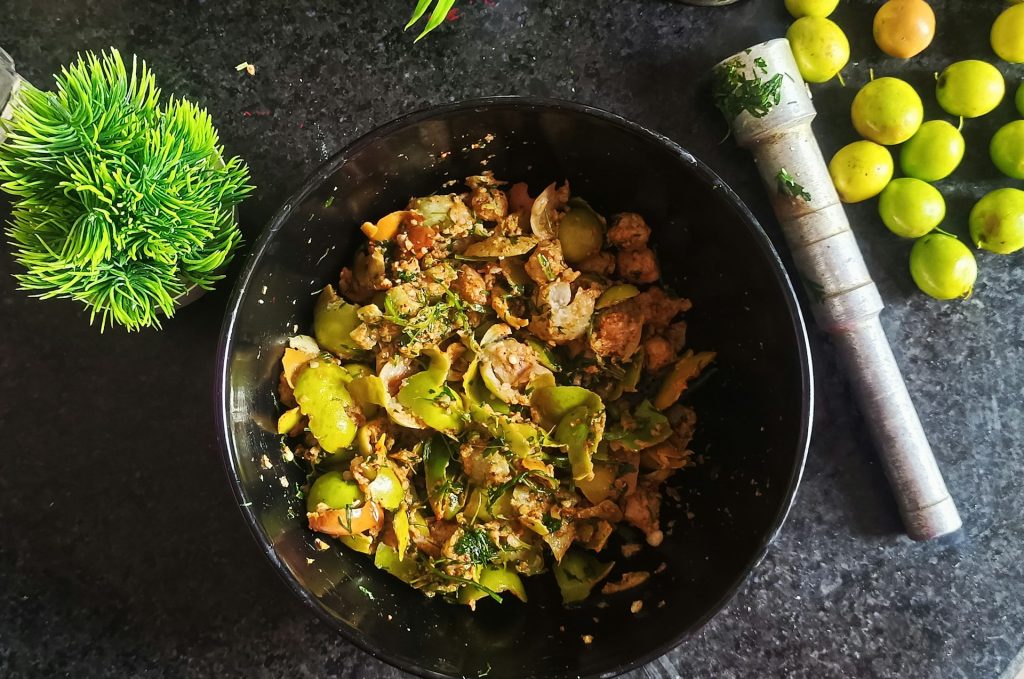
How Big Food has co-opted the vegan movement
Using the mainstream market economy’s advertising industry, Big Food has long enticed us away from healthy food with ever more clever lures into buying its products, while calling out organic food as unregulated and therefore dangerous to health. Their Fast Foods explosion was extremely seductive in a sped-up world where they hyped progress: No more slaving over stoves and washing dishes; everything prepared and packaged (mostly in plastic, and accompanied by plastic cutlery). All is designed either to be eaten from boxes as we race from home to work and back, or to be stashed in the freezer and popped into the microwave at our convenience. Everything uneaten, along with the packaging, simply tossed into garbage bins. Out of sight; out of mind.
Thus, Industrial Convenience Food vs. Health Food was, and still is, a major conflict that threatens Big Food’s market share through consumer patronage. Their marketers are onto us Health Foodies; we have become far too large in numbers and are interfering with their profits. Our unified objection to their unhealthy practices has given us ever increasing advantage, and so has been their greatest challenge. As far as I can see, they have come up with two major ways to respond:
1) If you can’t beat ‘em, own ‘em. The biggest, most successful organic brands and retailers have already been bought up. Easy to find info online by searching “natural and organic brands now owned by Big Food” or “Organic food makers now owned by huge corporations.” As just one example, for nearly $14 billion Amazon bought the Whole Foods chain in 2017, centralized their acquisition to reduce local products and numbers of organic options and to make shopping online even easier than going to a store.
2) Co-opting particular natural products or diets over others, to break up our unified force against them. The Impossible Burger represents a serious breakthrough for them, and is massively promoted as being vegan food, not for wimps, but for ‘he-men’. Across the land, it is already on countless restaurant menus. Vegans are now hailed by Big Food as having the superior diet and saving the planet thereby. Ignoring the distaste we healthy food folks have for vat-produced fake meat, GMO additives and chemically produced fake blood, they are launching potentially endless new versions of such ‘vegan meats’ into their already exploding fast-food markets of frozen plated vegan meals.
Can we end the new Diet Wars?
Let us not let Big Food co-opt and use our new dietary conflicts to their own advantage and our disadvantage. The discovery that it can be more profitable to close down CAFOs in favor of producing ‘vegan’ vat meat—however much the miracles of modern chemistry can make it appear to be real food—may well solve a big problem from an animal perspective, but not from a human perspective, as it will apparently produce even more unhealthy and even toxic food. The transition will not be overnight, however, and we may find some allies worth recruiting within the meat and dairy industry that now feeds Big Food production. Can we Health Foodies come together in agreement that diversified organic farms are worth saving? Can we make peace with each other?
It has been amply documented that family farms such as those I grew up on are far more energy efficient than hi-tech agriculture. Letting plants and animals feed each other on such healthy farms not only produces more food per hectare than monocultures, but also improves water tables and soils. Such farms produce ten energy calories of food for every calorie of input to them, while hi-tech agriculture, with its huge inputs of machinery, fossil fuels and chemicals requires hundreds of calories of input for one calorie of output! When technology becomes so dramatically inefficient, it is also clearly unsustainable. To be sustainable, food production must have greater energy output than input.*
To be effective in promoting healthy food, we must stop attacking each other, close ranks again and collaborate on addressing this new challenge. If CAFOs are actually closed down, will we be working to stop all the factory farming torture of our food plants? Producing plants for vat-food may even aggravate this torture.
Can we agree to re-integrating plants and animals as they were evolved to live together? We can do this by promoting integrated organic farms, as well as by regreening desertified land. The clear energy efficiency of doing so will actually mitigate climate change much better than simply going vegan—and going vegan will still be just as available an option, side by side with other diets. We can thus be united in our tolerance for each other’s healthy food choices.
Many ecovillages sprouting up all over Earth are showing the way, as are such huge music and arts festivals as Boom in Portugal, which sets up organic gardens fed by composting toilet wastes on ground with limited water resources. Indeed, peeing and pooping into drinking quality water was never a sustainable solution to human waste disposal, and should not continue into our future.
As it becomes ever more urgent, then, to deal effectively with the truly important conflict of interest between Health Food and Big Food, let us end these debilitating and dangerous Diet Wars that splinter our unified strength to collaborate in resisting unhealthy food.
* Meat vs Veg: An energy perspective | Posted by Eric Garza | July 10, 2014
“What ought we eat? This is among the preeminent questions of our time, one asked by policy wonks, diet gurus, and, of course, consumers. People imbue a wide array of values into their dietary choices, including impacts on their health, cost, and environmental impacts, among others. The question of what to eat generates a particularly generous array of fireworks when it pits plant eaters—vegans and vegetarians—against consumers of animal flesh. I do life cycle energy audits within the agricultural sector and have accumulated enough data to see a fascinating story emerge regarding one particular aspect of food production: its energy intensity. In this essay I’ll present data on the energy intensity of animal- and plant-derived foods, and hopefully contribute to a constructive dialog about what we ought to eat and how we ought to be producing it.”
APPENDIX
A Brief History of Food
From an evolutionary perspective it is very strange that an intelligent species has to tell itself what to eat on its own planet and to argue fiercely over the alternatives! For hundreds of thousands of years since we evolved as hunter gatherers there was no argument; Earth provided all species, including us humans, with nourishing food. From the earliest records we have, and surviving pockets of indigenous cultures, people knew and communed with both plants and animals as other sentient beings, with rituals of gratitude for those they consumed and conscious efforts to keep those species healthy. Spitting pits along hunting trails was surely the earliest agriculture.
Only with the invention of field agriculture did we decide that some plants were good, while others should be eliminated as bad— ‘weeds’, or even ‘non-plants’ (unkraut in German)—as we began the highly unnatural cultivation of the ‘good’ ones as monocrops. More and more natural forest was cleared to expand such food crops, leading to food surpluses that resulted in gradual empire building based on land ownership, urbanization, hierarchical classes, divisions of labor, military forces, taxation, debt money and other inventions of patriarchal empire. Eventually, the original empires gave way to national empires, which now give way to even more powerful corporate empires—all within the span of a mere six thousand years after hundreds of thousands of years of smaller human communities in relatively respectful harmony with Nature’s ways.
Just a few hundred years ago, access to ancient fossilized plants and animals in the form of oil led to the sudden dramatic increase of industrial mechanized food production. This caused a literal explosion of the planet-wide human population. Then the most dangerous practices began, just decades ago after WWII, when its munitions chemicals were found to be ‘useful’ in the peacetime agriculture touted as the Green Revolution. Other chemicals were quickly added for weed and insect ‘control’ as well as for food preservation and distant distribution in the burgeoning market economy of rapidly globalizing capitalist economics. However toxic, these chemicals are now staples in the cruel and toxic factory and field monoculture of the sentient plants and animals humans long ago revered, honored and protected as our relatives.
Food became an enormously lucrative commodity as corporations vied for ‘market shares. Instead of what Michael Pollan cited as “what our great-grandparents would have recognized as food,” we are now required to navigate miles of shelves of hundreds of thousands of packaged products lined up in chain super markets. As so many of their products are laden with added chemicals, our medical system has invented its own array of chemical mixtures as ‘medicines’ to keep ourselves alive.
The saving grace in this scenario is that enough people remembering the full flavors and colors of naturally growing food survived this process in time—now half a century ago—to launch an alternative movement to go back to what they called ‘Health’ or ‘Organic’ Food. Over that half century, I watched small shops and farmer’s markets grow into membership coops, back-to-farms migration, self-sufficient intentional communities and local living economies initiatives. Throughout this growing trend, I also watched an explosion of alternative health practices, experts, books and magazines touting an ever increasing array of diets and natural supplements and medicines—which brings us back to the beginning of this article.



